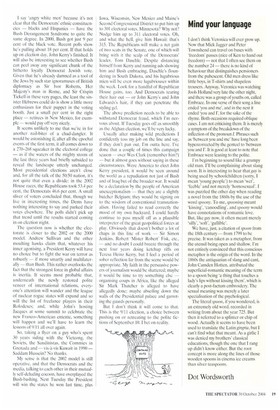Mind your language
I don't think Veronica will ever grow up. Now that Mick Jagger and Peter Townshend can travel on buses with 'freedom' passes (nice of Ken to hand out freedom) — not that I often see them on the number 24— there is no kind of behaviour that distinguishes pensioners from the pubescent. Old men dress like little boys, in T-shirts and shapeless trousers. Anyway, Veronica was watching „fools Holland very late the other night, and there was a group of youths on, called Embrace. In one verse of their song a line ended `you and me', and in the next it ended 'you and I', for the sake of the rhyme. Both occasions required oblique cases. I am not criticising them. It is merely a symptom of the breakdown of the inflection of the pronoun/. Phrases such as 'between you and me' have long been hypereorrected by the genteel to 'between you and I% It is good at least to note that Embrace were leaning to the polite.
I'm beginning to sound like a grumpy old man. I'll be complaining about slang soon. It is interesting to hear that gay is being used by schoolchildren (sorry, I mean 'young people') to mean 'wet', 'feeble' and not merely 'homosexual'. was puzzled the other day when reading a novel from the 1860s by the use of the word spoony. To me, spooning meant 'kissing', 'canoodling', and spoony would have connotations of romantic love. But, like gay now, it often meant merely 'silly', `soft', 'gullible'.
We have, just, a citation of spoon from the 18th century from 1799 to be precise. It was taken as a metaphor, from the utensil being open and shallow. I'm not entirely convinced that this conscious metaphor is the origin of the word. In the 1860s the antiquarian of slang and cant, John Camden Hotten, attributed the superficial-romantic meaning of the term to a spoon being 'a thing that touches a lady's lips without kissing them', which is clearly a post-facturn embroidery. The sexual meaning was merely a later specialisation of the psychological.
The literal spoon, if you wondered, is an extremely old word, recorded in writing from about the year 725. But then it referred to a splinter or chip of wood. Actually it seems to have been used to translate the Latin gingria, but! can't find what that meant. As a girlie I was denied my brothers' classical educations, though the one that I rang up didn't know either. But the root concept is more along the lines of those wooden spoons in cinema ice creams than silver teaspoons.
Dot Wordsworth


















































































































 Previous page
Previous page